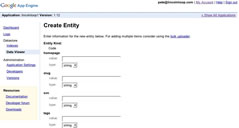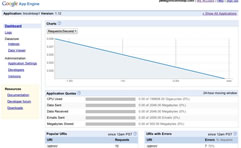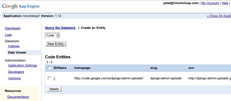For those of you that have been hiding under a rock for the last 12 hours, App Engine is Google’s answer to Amazon Web Services. While it is less flexible in some senses (you don’t have a complete OS at your disposal), it does provide tighter integration for web applications and even includes a (somewhat crippled) version of Django out of the box.
I’m pretty excited about this mainly because I’m not a big fan of server administration, so I took a couple hours this morning to test it out. Here are some quick notes:
The Good
- It sort of works with Django
- Deployment is dead simple
- It handles user accounts and registration
- Every app gets a built in Admin Console with stats, version management and datastore CRUD capability
- You can add your own Python libraries
- And, of course, it will scale on the fly
The Bad
- Datastore is not a relational database
This excludes you from using models or anything that depends on them in Django, including the admin, sessions, the authorization framework. - Only pure Python libraries can be used and some libraries are disabled
The Ugly
- YAML configuration files
- Admin CRUD interface is no match for Django’s, see screenshots below.
Other Observations
- Much of the API is clearly influenced by Django making transitioning easier.
- Pricing has not been released, but from this statement, it appears they will have free accounts:
“For now, account registrations are limited to the first 10,000 developers, and applications are restricted to the free account limits.” - Generic views don’t work with the datastore queries ’Query’ object has no attribute ‘_clone’
- The datastore admin interface only becomes active once you have saved an object for the model.
Screenshots
Adding an item to the Datastore

Conclusion
Despite its limitations, I think App Engine is going to be a great thing for the Django community and I can’t wait to host my apps there.
I started migrating my site over (lincolnloop1.appspot.com) with some quick hacks, but realized that creating a Django database backend for the App Engine Datastore (a.k.a. BigTable) is going to be the best route. I’m not a database guru and I haven’t dug into Django’s database internals, but it looks feasible. The basic stuff is so close to Django that I’m hoping it will be pretty straightforward and we should be able to emulate more advanced queries with some Python magic. I’m happy to open up an app and I started a Google Code project django-appengine-backend for any developers that are interested in working on the project.



